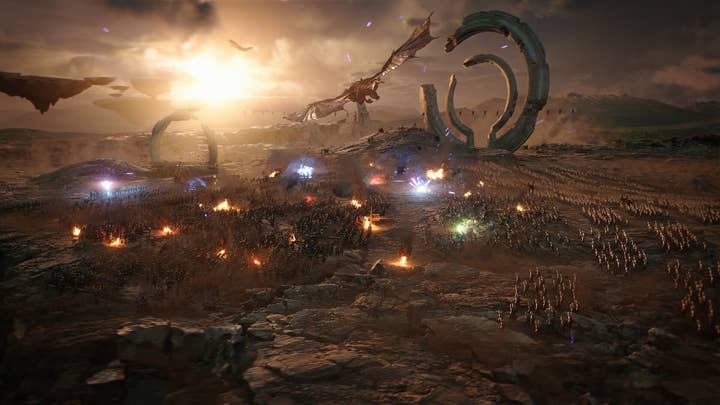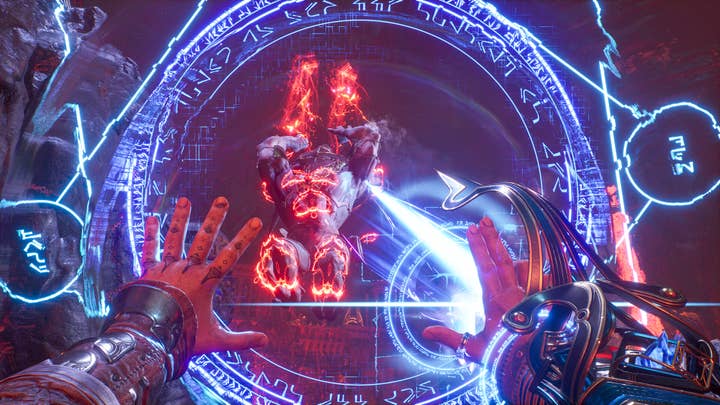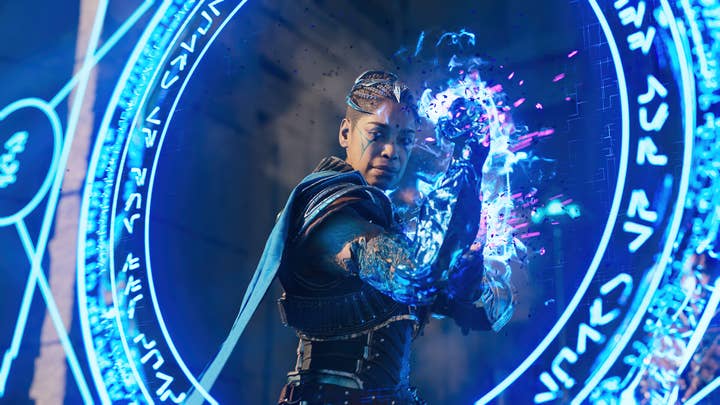Making a single-player magic shooter in a multiplayer military world
Ascendant's Bret Robbins says he "didn't really have a choice" but to make Immortals of Aveum after leaving Call of Duty development
When Bret Robbins left Sledgehammer to start Ascendant Studios in 2018, there was little doubt about what kind of game his new operation would specialize in.
"I'd been working on Call of Duty for a number of years and I largely directed the single-player campaigns for that," Robbins explains to GamesIndustry.biz. "Single-player is something I've done my entire career, going all the way back to Crystal Dynamics and games like Blood Omen 2 and EA, where I was the creative director on Dead Space. So I knew that if I had the opportunity to start my own studio and make my own game, single-player would feature prominently in one way or another."
The end result is the multiplatform Immortals of Aveum, set to launch July 20 through EA Originals. The game combines Robbins' focus on single-player, his acumen with shooters from his tour of duty on Activision's flagship franchise, and… magic?
"As far as it being a magic shooter, the impetus for that came from my time on Call of Duty and just learning how to make a great, big-budget, mass market shooter, and then looking around and not seeing anyone doing that in the fantasy space," Robbins says.
"That seemed like a real missed opportunity. It was a game I really wanted to play, and eventually it was a game I really wanted to make. Fortunately, I had an investor who agreed with me, so in 2018 we founded the company really just to make this game, Immortals of Aveum."
"I wasn't too concerned with what the landscape of the industry was like. What I knew is that I really wanted to make a game like this"
It was an interesting decision to make in 2018, after years of hand-wringing about whether the format was still viable in the AAA space. 2018 was the year that Call of Duty: Black Ops 4 decided to skip the traditional single-player campaign to no ill effects, but it was also the year games like God of War, Marvel's Spider-Man, and Assassin's Creed Odyssey helped breathe new life into the single-player format. So how did Robbins not only decide to embrace single-player for Ascendant, but convince his backers it would provide the return on investment they wanted?
"I certainly didn't make many decisions trying to accomplish a marketing angle, really," he says. "I wasn't too concerned with what the landscape of the industry was like. What I knew is that I really wanted to make a game like this. I wanted to play a game like this, and I had faith there were enough players out there that would also be interested in something like that.
"Certainly there are a lot of fans of single-player games. Flat out, I think all of us enjoy a good story. So I felt that if we told a great story and had a strong and compelling game, we'd find an audience one way or another. I think the reports of the death of the single-player game were greatly exaggerated, even though it did seem like there were less of them coming out."

Even so, Robbins notes that AAA games tend to be well-represented among the top ten best-selling AAA games each year, whether it be the aforementioned 2018 crop of titles, Ghost of Tsushima, or titles like Elden Ring, which considers to be primarily single-player despite its multiplayer elements.
"Every year there would be huge, huge successes in the single-player space," he says. "So I felt like if you're going out to make a massive multiplayer game, that to me is just as risky as making a great single-player game. It's for different reasons, but the risks are there no matter what you do when you're making something of this budget level."
He adds, "I've done narrative games, and my job has largely been to figure out the crossover between great game design and great narrative, so it was something I knew I had to do and really the thing I'm probably best at, from my own personal skills. In some ways you could say I didn't really have a choice; I was going to make a game like this. And at the end of the day, that's mostly because it was the kind of game I wanted to play."
"There's just such an ease and familiarity with a standard shooter, holding a gun, understanding what a gun should be able to do"
While there have been plenty of single-player shooters before, there are far fewer with a focus on magic rather than munitions. And Robbins concedes there were points during the course of Immortals of Aveum's development where he learned first-hand why that might be.
"There's just such an ease and familiarity with a standard shooter, holding a gun, understanding what a gun should be able to do," he says. "We just have so many years of muscle memory when it comes to how that sort of thing should play. But you start to experiment and do something new, and very quickly you can run into rough waters in terms of how you're going to make this be accessible and interesting.
"We certainly went down some roads of the magic system getting too complicated, the controls being byzantine and unusual and inaccessible. About ten or 12 months in, I really just had to stop and say, 'You know what? We really need to make a shooter first. We're going to do all this cool stuff with interesting spells and abilities and the way we'll combo all those things together… but we have to start with making a shooter and then layer all of those elements that are going to make us interesting on top of that'."

He says the team spent six to eight months working on a prototype to refine the core gameplay.
"It was really just the core gameplay; it had the player's spells, a bunch of enemies, and it was a series of what we call combat lightboxes," he says. "And it was great. It was actually one of the reasons EA became interested in us, that particular demo.
"Once we knew we had that, everything else started to fall into place. Now we can do more of the crazy stuff we want to do on top of that and build out the levels and world in a way that makes sense. It took some time. We definitely did some fast failing in the beginning and then we found our legs."
The big challenge was figuring out which elements and concepts from a traditional shooter experience they wanted to keep, and which ones they wanted to tweak or completely reinvent. The result is that some shooter staples like reloading and clip size have functional counterparts in Immortals of Aveum, while other common trappings of the genre are absent.
"We wanted some analogies in there, so some of the spells do feel like more traditional guns, but we wanted to make sure the always had something interesting about them or some kind of magical twist," Robbins says. "And then we also wanted abilities and spells that generally you'd never see in a shooter that would allow us to be more original, stand out, and be more fun. We were always walking that line between accessibility and familiarity, and bringing in something new."
"This wasn't going to be 'soft' magic. It wasn't going to be Harry Potter or Lord of the Rings"
It's a balancing act, and one that a chunk of the other magic-themed shooters that have released in the past have failed it, in Robbins' view.
"They simply didn't have the visceral feel a gun has, that feedback mechanism you get from firing a gun," he says. "It's a very powerful feeling, it's very impactful. So we wanted our magic to feel that way. This wasn't going to be 'soft' magic. It wasn't going to be Harry Potter or Lord of the Rings. It needed to be something else, something a little more intense. So we spent a lot of time getting just the core abilities to really feel powerful in that way."
As for whether he can convince fans of his work on Call of Duty to take the leap to a premise more overtly detached from reality, Robbins isn't concerned.
"It's a massive audience," he says. "When we talk about Call of Duty gamers, a lot of times we're just talking about gamers, because a lot of people would show up to buy that game every year.
"I never wanted to underestimate what those gamers might like. I'm a Call of Duty player, I used to make Call of Duty. But I certainly wanted an experience sort of like that, but in a fantasy setting. Immortals of Aveum is not Fantasy Call of Duty. It's quite a different game, but as a jumping off point and initial idea, it was really compelling to me.
"And I felt as many people do who are trying to create something, you're feeling that if I feel this way, there are probably enough people out there that also feel this way that I could find an audience for it."










